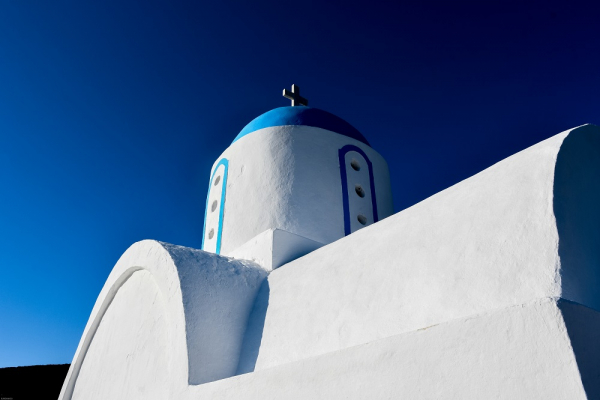Today, Friday 21 May 2021, is the Day of the Saints Constantine's and helen's, With the holiday calendar includes many names that are celebrating today:
- Konstantinos, Kostas, Kostis, Kostantinos, Kostakis, Konstantina, Konstantia, Konstantina, Kostoula, Dina, Nadia,
- Eleni, Elena, Eleanna, Eleana, Lena, Lenitsa, Lengo, Lenio, Eleonora, Eleonora, Nora, Marilena, Elenaki, Nitsa.
According to sansimera.gr, on this day, every year, the Orthodox Church "honors the memory of the Roman emperor Constantine I the Great and his mother Helen", Whom he calls Isapostolos for the great services they offered to Christianity ".
"Constantine (272-337) reigned from 306 until his death. With his decree on secularism (313) he stopped the persecutions against Christians, thus helping the unhindered practice of worship and the spread of the new religion. In 325 he convened the First Ecumenical Council in Nicaea, Asia Minor and addressed it in person. This synod is fundamental in the course of Christianity, as it condemned the heresy of Arianism and shaped its doctrine ("Symbol of Faith"). Shortly before his death he was baptized a Christian.
The Roman Catholic Church has not included Constantine the Great in its Hagiology, because the historical investigation charges him with the order for the murder of Crispus 'son (by his first wife Minervin) and Faustus' second wife (Crispus and Faustus must have had an affair). relationship, according to more recent historical data). On the contrary, in addition to the Orthodox Church, the Anglican Church and various Lutheran denominations honor his memory.
Queen Eleni (246/250 - 327/330) found the Holy Cross in the Holy Land and financed the construction of Christian temples in many parts of the empire. The Roman Catholic Church commemorates her on August 18 ", according to the same source.
For Saint Helen, Wikipedia adds "Helen's great glory, especially among the Christian populations, is due to the finding of the Holy Cross. Historians have some doubts as to whether this tradition is a historical fact. Eusebius, although giving detailed information about Helen's works in Jerusalem, does not mention the discovery of the Holy Cross. From the writings of St. Cyril, Patriarch of Jerusalem, it is clear that a piece of the relic was in Jerusalem at the end of 340. The same Patriarch, after 351, writes to Emperor Constantius II, son of Constantine the Great, that Constantine the Great years of Constantine, but does not mention who found him (Ep. ad Const., 3 PG 33, 1168B). Rufinus is the one who, in his own "Ecclesiastical History", connects Helen with the finding of the Holy Cross (Hist. Eccl 10, 7-8). In any case, both the Orthodox and the Catholic Church have embraced the relevant tradition, which as early as the second half of the 4th century had spread throughout the Roman Empire (Helen died in the first half of the 4th century).
After completing her journey to the East, Eleni settled in Nicomedia. There she died at the age of 80 with her son Constantine at her side, as Eusebius informs us (VC, 3.46). The fact that from the beginning of 329 AD. The minting of coins in its form stops abruptly, leading us to the conclusion that her death occurred in the late 328 or early 329. She was buried with royal honors in Rome, in the mausoleum on Lavicana Street. Later, her body was transported to the catacombs of Peter and Markellin. The purple sarcophagus that contained her body is now in the Vatican Museum.
The Church declared her a saint and an apostle. Her memory is celebrated by the Orthodox, together with her son Constantine, on May 21 (the same day her memory is also celebrated by the Lutheran Church), while by the Catholics on August 18 (the Catholic Church has not classified her saints Constantine the Great) ".
For Constantine the Great, Wikipedia states, among other things, that "he was the first Roman emperor to convert to Christianity. Although he lived most of his life as a pagan, according to many sources he embraced the Christian faith shortly before his death, being baptized by Eusebius of Caesarea. He also played an important role in the Decree of Milan in 313, according to which Christians and believers of other religions had complete freedom to practice their religion - yet he oppressed other religions, destroying temples among other measures he took [citation needed] ]. He convened the First Ecumenical Synod during which the Creed was established. The Church of the Resurrection was built on the orders of him and his mother, St. Helen, in the area of Jesus' tomb in Jerusalem, which remains the holiest part of Christianity. At the same time, the papal claim to timeless power in the Middle Ages was based on the supposed Donation of Constantine (now considered a forgery).
He has been proclaimed an Apostle and is revered as a Saint by the Eastern Orthodox Church together with his mother St. Helen on May 21st. He has historically been referred to as the "First Christian Emperor", and has strongly promoted the Christian faith. Nevertheless, its relationship with Christianity remains a controversial issue that can be interpreted multiple times. "
